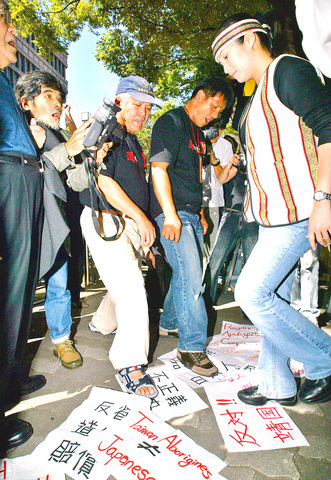A Japanese court yesterday ruled that Prime Minister Junichiro Koizumi violated the Constitution's rules on religion by going to a Tokyo war shrine that critics say glorifies Japan's militarist past. However, the Osaka High Court rejected the Taiwanese plaintiffs' claims to be compensated over the visits.
The panel said that Koizumi's worshipping at the Yasukuni shrine is a public act and therefore violates the constitutional separation of state and religion, a lawyer for the plaintiffs said.
It was not immediately clear whether the ruling had the force to prevent further visits, but plaintiffs and their supporters called the decision a watershed.

PHOTO: AFP
It was the second time in 18 months a court has ruled such visits unconstitutional.
"This is groundbreaking, a landmark ruling," plaintiffs' lawyer Mitsunori Nakajima said from Osaka. "Most important was the recognition that Koizumi's visits were clearly carried out in a public capacity."
Koizumi and other government officials were disappointed.
"I don't understand why my visits to Yasukuni violate the Constitution," Koizumi said at a parliamentary session following the ruling. "I'm paying my respects to those who died in the war, with the conviction that we must never wage such a war again."
"I visit Yasukuni as a private citizen, and as prime minister, but not in a public capacity," he said.
The court rejected compensation demands of ?10,000 (US$88) by each of the 188 plaintiffs, who included Independent Legislator May Chin (高金素梅) and bereaved families of World War II veterans from Taiwan, many of them enshrined at Yasukuni against the families' wishes, according to court spokesman Masaharu Otani.
"We're not satisfied with today's ruling, though it did take one little step forward," Chin said. "We urge the Japanese government to take three or four steps forward," she said.
"The ruling suggested Japan has started to face the fact that emergence of militarism would endanger the humanity," she said in a statement.
"It is regrettable, however," she continued, that, "Japan has yet to face up to its past `monstrous crimes' which it had committed against Taiwan's Aborigines."
It was the second ruling on a lawsuit concerning the shrine in as many days. On Thursday, the Tokyo High Court turned down a similar case and declared Koizumi's visits were private, but it did not rule on the constitutionality of worshipping at Yasukuni.
Koizumi has gone to the shrine four times since becoming prime minister in April 2001.
"These visits go against Article 20 of the Japanese Constitution, which calls for the separation of the state and religion," the ruling read, according to Nakajima.
The court noted that Koizumi visited the shrine with a government secretary and used a state car, and also criticized him for not clearly denying he was on an official visit.
Additional reporting by staff writer

Right-wing political scientist Laura Fernandez on Sunday won Costa Rica’s presidential election by a landslide, after promising to crack down on rising violence linked to the cocaine trade. Fernandez’s nearest rival, economist Alvaro Ramos, conceded defeat as results showed the ruling party far exceeding the threshold of 40 percent needed to avoid a runoff. With 94 percent of polling stations counted, the political heir of outgoing Costa Rican President Rodrigo Chaves had captured 48.3 percent of the vote compared with Ramos’ 33.4 percent, the Supreme Electoral Tribunal said. As soon as the first results were announced, members of Fernandez’s Sovereign People’s Party

MORE RESPONSIBILITY: Draftees would be expected to fight alongside professional soldiers, likely requiring the transformation of some training brigades into combat units The armed forces are to start incorporating new conscripts into combined arms brigades this year to enhance combat readiness, the Executive Yuan’s latest policy report said. The new policy would affect Taiwanese men entering the military for their compulsory service, which was extended to one year under reforms by then-president Tsai Ing-wen (蔡英文) in 2022. The conscripts would be trained to operate machine guns, uncrewed aerial vehicles, anti-tank guided missile launchers and Stinger air defense systems, the report said, adding that the basic training would be lengthened to eight weeks. After basic training, conscripts would be sorted into infantry battalions that would take

GROWING AMBITIONS: The scale and tempo of the operations show that the Strait has become the core theater for China to expand its security interests, the report said Chinese military aircraft incursions around Taiwan have surged nearly 15-fold over the past five years, according to a report released yesterday by the Democratic Progressive Party’s (DPP) Department of China Affairs. Sorties in the Taiwan Strait were previously irregular, totaling 380 in 2020, but have since evolved into routine operations, the report showed. “This demonstrates that the Taiwan Strait has become both the starting point and testing ground for Beijing’s expansionist ambitions,” it said. Driven by military expansionism, China is systematically pursuing actions aimed at altering the regional “status quo,” the department said, adding that Taiwan represents the most critical link in China’s

EMERGING FIELDS: The Chinese president said that the two countries would explore cooperation in green technology, the digital economy and artificial intelligence Chinese President Xi Jinping (習近平) yesterday called for an “equal and orderly multipolar world” in the face of “unilateral bullying,” in an apparent jab at the US. Xi was speaking during talks in Beijing with Uruguayan President Yamandu Orsi, the first South American leader to visit China since US special forces captured then-Venezuelan president Nicolas Maduro last month — an operation that Beijing condemned as a violation of sovereignty. Orsi follows a slew of leaders to have visited China seeking to boost ties with the world’s second-largest economy to hedge against US President Donald Trump’s increasingly unpredictable administration. “The international situation is fraught